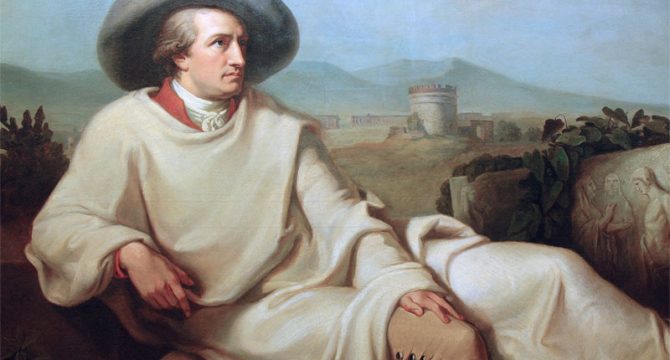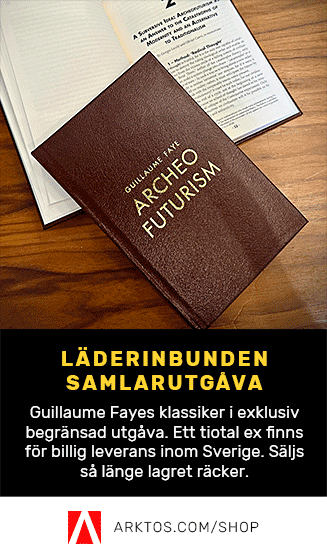Goethe intar en särställning i tysk historia, jämförbar med Nietzsches. I likhet med ”der olle Nitschke” uppskattades Goethe inte minst för sina psykologiska insikter, Klages nämnde hans självbiografi som obligatorisk läsning för karaktärologer och Carlyle beskrev honom som ”neither noble nor plebeian, neither liberal nor servile, nor infidel nor devotee; but the best excellence of all these, joined in pure union”. Självbiografin, Aus meinem Leben: Dichtung und Wahrheit, är ett bra exempel på Goethe som psykolog, den innehåller bland mycket annat flera psykologiska reflektioner. Utöver dessa får vi följa Goethes uppväxt och bildning i den fria riksstaden Frankfurt, hans kärlekshistorier, samtidshistoria, relationen till Lavater, övernaturliga erfarenheter, poesi et cetera. Hans tanke med självbiografin får betraktas som både ambitiös och insiktsfull, ”this seems to be the main object of biography, — to exhibit the man in relation to the features of his time, and to show to what extent they have opposed or favored his progress; what view of mankind and the world he has formed from them, and how far he himself, if an artist, poet, or author, may externally reflect them. But for this is required what is scarcely attainable; namely, that the individual should know himself and his age, — himself, so far as he has remained the same under all circumstances; his age, as that which carries along with it, determines and fashions, both the willing and the unwilling: so that one may venture to pronounce, that any person born ten years earlier or later would have been quite a different being, both as regards his own culture and his influence on others.”
Självbiografin har mängder av intressanta trådar. Vi får veta att Goethe å ena sidan uppskattade Eddan och de nordiska sagorna, å andra sidan hade svårt att använda sig av dem i sin konst. Han såg dem som unika inte minst genom deras humoristiska underton, ”the humoristic vein which runs through the whole Northern mythus, was to me highly pleasing and remarkable. It appeared to me the only one which jests with itself throughout, — wondrous giants, magicians, and monsters opposed to an odd dynasty of gods, and only occupied in leading astray and deriding the highest persons during their government, while they threaten them, besides, with disgraceful and inevitable destruction”. Vi får också veta, överraskande nog, att Lavater, sin tids stora fysionom, stötte på motstånd från fula människor. Goethe refererade för övrigt flitigt till Lavater och fysionomin i självbiografin. Om Lenz skriver han bland annat att ”he had a small but neat figure, a charming little head, to the elegant form of which his delicate but somewhat flat features perfectly corresponded; blue eyes, blond hair, in short, a person such as I have from time to time met among northern youths; a soft and as it were cautious step, a pleasant but not quite flowing speech, and a conduct which, fluctuating between reserve and shyness, well became a young man”. För den som ser dialektiken som den genuint germanska logiken är annars Goethes resonemang kring det ”daemoniska” av intresse, ”to this principle, which seemed to come in between all other principles to separate them, and yet to link them together, I gave the name of Daemonic, after the example of the ancients and of those who, at any rate, had perceptions of the same kind.”
Goethe som tysk
Goethe som tysk patriot framträder också tydligt i självbiografin, dock inte som någon onyanserad chauvinist. Om tyskarna får vi bland annat veta att tysken, ”kind and magnanimous by nature, likes to see no one ill-treated”, och att bland tyskarna ”the common voice is more apt to prevail than with other nations”. Goethe identifierar också ”the German sense of freedom and joy”, ”immoveable German honesty” och en ”German love of truth and nature”. Intressant blir det när Goethe kontrasterar andra europeiska nationalkaraktärer mot den tyska, och då inte minst hur de uttrycks genom poesin. Han skriver bland annat att ”what further makes the English poets accomplished misanthropes, and diffuses over their writings the unpleasant feeling of repugnance against everything, is the fact that the whole of them, on account of the various divisions of their commonwealth, must devote themselves for the best part, if not for the whole of their lives, to one party or another.” Han gör dock ett undantag för Shakespeare, särskilt uppskattad av tyskar. Angående fransmännen skriver han att ”the French way of life we found too defined and genteel, their poetry cold, their criticism annihilating, their philosophy abstruse, and yet insufficient.” Goethes nyanserade patriotism mynnar bland annat ut i skepticism mot ett överdrivet antal lånord och insikten att motståndet mot lånord ibland kombineras med bristande konstnärlig kvalitet. Han skriver här om ”a language disfigured by foreign words, forms, and turns of speech on the one hand, and the worthlessness of such writings as had been careful to keep themselves free from those faults on the other, though it occurred to nobody, that while they were battling against one evil, the other was called on for assistance”.
Goethes patriotism knyts till ett organiskt samhällsideal, där fursten är av central betydelse även för poesin. Han skrev om Fredrik den Store och den tyska poesin att ”all national poetry must be shallow or become shallow which does not rest on that which is most universally human, — upon the events of nations and their shepherds, when both stand for one man. Kings are to be represented in war and danger, where, by that very means, they appear as the first, because they determine and share the fate of the very least, and thus become much more interesting than the gods themselves, who, when they have once determined the fates, withdraw from all participation in them. In this view of the subject, every nation, if it would be worth anything at all, must possess an epopee, to which the precise form of the epic poem is not necessary.”
Goethe och poesin
I revere the rhythm as well as the rhyme, by which poetry first becomes poetry; but that which is really, deeply, and fundamentally effective—that which is really permanent and furthering, is that which remains of the poet when it is translated into prose. Then remains the pure, perfect substance, of which, when absent, a dazzling exterior often contrives to make a false show, and which, when present, such an exterior contrives to conceal.
– Goethe
En givande tråd i självbiografin rör poesin, intressant inte minst i vår tid då den poetiska dimensionen är lika förträngd som den oneiriska. Att vuxna män idag ägnar sig åt gemensam högläsning av dikter hör inte till vanligheterna, man kan fråga sig vad som gått förlorat under den process som fört oss dit. Oavsett vilket, för Goethe hade poesin en central betydelse. Han skrev bland annat att filosofi, religion och poesi svårligen kunde skiljas från varandra, ”with the most ancient men and schools I was best pleased, because poetry, religion, and philosophy were completely combined into one.” En aspekt av den moderna världen är att dessa tre skiljts åt. Goethes inställning till den franska filosofin återkommer i hans möte med Voltaire, han skriver här att ”the factious dishonesty of Voltaire and the perversion of so many worthy subjects became more and more annoying, and we daily strengthened ourselves in our aversion from him. He could never have done with degrading religion and the sacred books, for the sake of injuring priestcraft, as they called it, and had thus produced in me many an unpleasant sensation”. Goethes poetiska perspektiv mynnar också ut i en kritik av ”those things by which the public is particularly excited; of those two hereditary foes of all comfortable life, and of all cheerful, self-sufficient, living poetry: — I mean, satire and criticism.” Satiren och kritiken framstår som besläktade med poesin, men subversiva. Goethe utvecklar detta i ett stycke samhällsanalys, ”in quiet times every one will live after his own fashion; the citizen will carry on his trade or his business, and enjoy the fruits of it afterwards; thus will the author too willingly compose something, publish his labours, and since he thinks he has done something good and useful, hope for praise, if not reward. In this tranquillity the citizen is disturbed by the satirist, the author by the critic, and peaceful society is thus put into a disagreeable agitation.”
Poesins sanning identifieras av Goethe som ”the representation of manners, character, passions, in short, the whole inner man; to which, indeed, poetry pre-eminently belongs”, han skriver även att ”true poetry announces itself thus, that, as a worldly gospel, it can by internal cheerfulness and external comfort free us from the earthly burdens which press upon us. Like an air-balloon, it lifts us, together with the ballast which is attached to us, into higher regions, and lets the confused labyrinths of the earth lie developed before us as in a bird’s-eye view. The most lively, as well as the most serious works, have the same aim of moderating both pleasure and pain by a felicitous intellectual form.”
Sammantaget är självbiografin läsvärd, inte minst för Goethes träffsäkra beskrivning av poesin och kopplingen till religion och filosofi.












